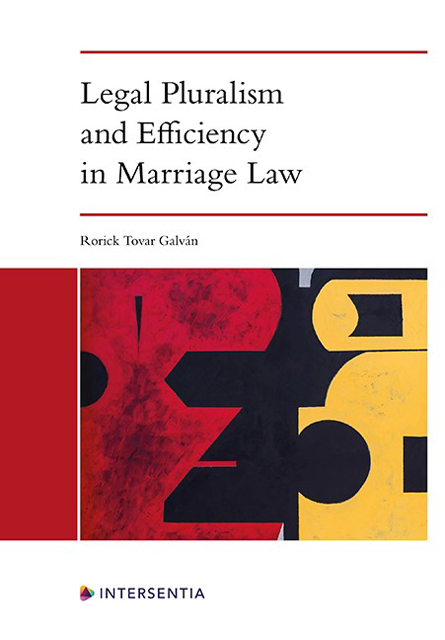Book contents
- Frontmatter
- Dedication
- Miscellaneous Frontmatter
- Foreword
- Preface
- Acknowledgments
- Contents
- List of Cases
- Introduction: Uncertainty and Inconsistency Surrounding the Determination of the Applicable Law in the EU Instruments on Matrimonial Issues
- Part I Economics As A Point Of Departure To Explain The Substantive Rules On Matrimonial Issues
- PART II Economics as a Point of Departure to Build a System of Conflict of Laws For Matrimonial Issues
- Conclusion: Certainty, Precision, Coherence, and Simplicity in the Determination of the Applicable Law
- Bibliography
- Index
- About the Author
Conclusion: Certainty, Precision, Coherence, and Simplicity in the Determination of the Applicable Law
Published online by Cambridge University Press: 17 December 2022
- Frontmatter
- Dedication
- Miscellaneous Frontmatter
- Foreword
- Preface
- Acknowledgments
- Contents
- List of Cases
- Introduction: Uncertainty and Inconsistency Surrounding the Determination of the Applicable Law in the EU Instruments on Matrimonial Issues
- Part I Economics As A Point Of Departure To Explain The Substantive Rules On Matrimonial Issues
- PART II Economics as a Point of Departure to Build a System of Conflict of Laws For Matrimonial Issues
- Conclusion: Certainty, Precision, Coherence, and Simplicity in the Determination of the Applicable Law
- Bibliography
- Index
- About the Author
Summary
The existence of multiple legal systems in the international arena is a major issue for married couples with distinct nationalities, owning property abroad or having resided in at least two countries. Any of these circumstances might cause significant changes in the rights and obligations derived from their marriage, as courts can use a variety of approaches to determine the legal system – or legal systems – applicable to legal disputes between them. Although there are national and international sets of rules dealing with this problem, their solution does not cope adequately with the challenges of legal pluralism in the current context. The international instruments promoted by the European Union are a good example of this. They not only restrict party autonomy unnecessarily and include dissimilar limits and conditions for the enforceability of choice of law agreements; they also use dissimilar approaches for the determination of the applicable law in the absence of a choice of law agreement. Furthermore, under certain circumstances, the default conflict rules undermine legal certainty significantly, and allow one spouse to manipulate the law governing their relationship unilaterally.
The aim of the book was to present a new approach to understanding marriage and marriage law that in turn serves as a corner-stone for building a conflict of laws system that prioritizes predictability and congruency in the determination of the applicable law. With this goal in mind, the book borrowed some ideas and concepts from economics to reframe the matrimonial dynamic from a different perspective and so tried to provide fresh and new answers to legal questions related to the determination of the applicable law. Against this background, marriage has been described as having the same objective as a contract, an instrument that builds trust between two individuals to enable exchanges of complementary and reciprocal efforts. Marriage is seen as a tool to obtain, through reciprocal cooperation, certain assets of monetary and non-monetary value that are otherwise impossible or very difficult to obtain alone. The function of marriage law is providing a framework that reinforces trust and removes obstacles hindering these cooperative dynamics.
- Type
- Chapter
- Information
- Legal Pluralism and Efficiency in Marriage Law , pp. 245 - 248Publisher: IntersentiaPrint publication year: 2022



